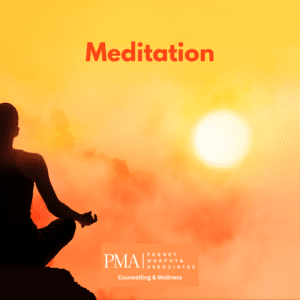
by Murray Heintz, Registered Psychologist
Meditation.
Quite often, the therapist discusses meditation in therapy. What image comes to your mind when you hear someone talk about meditation? Many people immediately picture someone sitting cross-legged in the lotus position or repeating mantras when meditation is mentioned. However, there are so many activities you can and probably are doing that can be meditative.
You may be surprised to learn that mediation takes many forms. The method you use is less important than the benefits you can reap. Going for a walk, listening to music, watching a fireplace burn, or even enjoying your favorite food’s taste, texture, and smell can be considered meditative practices. Meditation enhances attention, emotional awareness, kindness, compassion, sympathetic joy, and mental calmness, even under challenging circumstances.
The method in which you meditate is less important than the benefits you can reap. These benefits include a reduction in stress and anxiety levels. Negative thoughts can be suspended in the time that you are immersed in the activity. It can help you focus your attention on the present moment.
So, read that book, enjoy the tranquility of looking out over a calm lake, and savor that cup of coffee—whatever way you choose to bring peace to yourself is all meditation.

